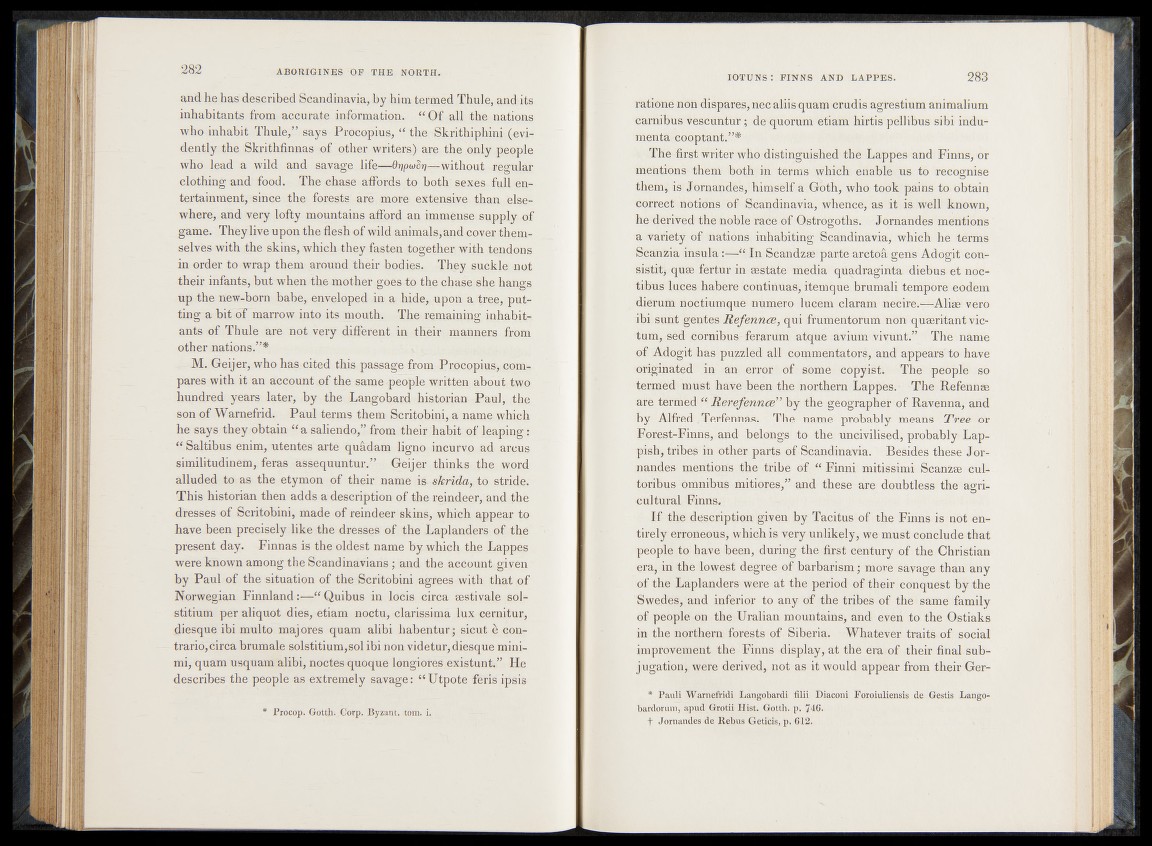
and he has described Scandinavia, by him termed Thule, and; its
inhabitants from accurate information. ^.Q'f all the nations
who inhabit Thule,” says Procopius, “ :tfre>Skrithiphini
dently; the Skrithfinnas -of other writers) are the only people
who lead a wild and savage life—dqpwdri—without regular
clothing and food. The chase affords to both; se^.eS,full entertainment,
since the forests are more extensive than elsewhere,
and veiy lofty mountains afford an immense supply of
game. They live upon the flesh of wild animals,and cover themselves
with the skins, which they fasten together with tightens
in order to wrap them around their bodies., They suckle not
their infants, but when the mother goes tp the chase she hangs
up the new-born babe, enveloped in a hide,, upon a treg,;putting
a bit oT marrow into its mouth. The remaining inhabits
ants of Thule are not very different in theiryma-nners from
other nations.”*
—M. Geijer, who has.cited this passage from Procopius,, compares
with it an account of the same «people written; abo'ut two
hundred years later, by the Langobard historian Paul, the
son of Wamefrid. Paul terms them Scritobini, a. name which
he says they obtain “ a-saliendo^Trom their habitaaf
“ Saltibus enim, utentes arte quadam ligno incurvo ad arcus
similitudinem, feras assequuntur.” Geijer thinks thg..word
alluded to as the etymon of their name ia skrida, to stride.
This historian then adds a description of the reindeer, and fhe
dresses of Scritobini, made of reindeer skins, which appear tq
have been precisely like the dresses of the Laplanders; of f he
present day. Finnas is the oldest name by which the Lappes
were known among the Scandinavians; and the account giyen •
by Paul of the situation of the Scritobini agfees with that of
Norwegian Finnland*~“ Quibus in locis circa aesti vale sol-
stitium per aliquot dies, etiam noctu, clarissima lux cernitur,
diesque ibi multo majores quam alibi habenturj sicut & con-
trario, circa brumale solstitium,sol ibi non videtur, diesque minimi,
quam usquam alibi, noctes quoque longiore.s existunt” He
describes the people as extremely savage: “ Utpote feris ipsis
* Procop. Gotth. Corp. Byzant. tom. L
ratiöne noh dispares, nec aliis quam crudis agrestium animalium
carnjbus vescuntur ^td^quorum etiam hirtis pellihus sibi indumenta
cooptant.W^
- The -first writer who distinguished the Lappes and Finns, or
mentions-; them bo^frym,, terms which enable us to recognise
them, is Jornandes, himsfeif-a.Goth, who took pains to. obtain
correct notions-'bfr Scandinavia, wherice^istüt is well known,
bte deriyedHhe noble ra!ce!of i^tr'ogoth^;, V.»J omandba mentions
a variety of nations inhabiting Scandinavia, which he terms
S^eafe&ia in su la :—“ ImSdahdzae parte arctöätgens Adogit cofi-
si&titi quae fertur'ib ^ stä te -media qdadraginta drebus, et noc-
tibus luces hab'eteIcOntinuas, itemque.br'umali tempore eodem
dierum rioctiumque numero lucern c-laram neCire.-^Alim vero
ibh sunt S tates Refennce, qui frifr#entorum non quaeritantvic-
turn, sed'jcornibülffera-rum atque avium vivunt;^' The name
of Adogit hasjpuyzled all r'commentators, and appears'to have
originated in än error,* of' some- copyist.' The people so
termed* must have blcpn the northern Lappes.* The Refennsa
ate term%l- “ Rerefennce” by! the ;g4ogfaph:er o f Ravenna; and
by Alfred .Terfennas. The name probably means Tree or
Eorest-Finns, and belongs' to the uncivilised, probably+;Lap'-
pish, t r i c e p o th e r , parts of ■ Scandinavia. Besides these Jor-
nandes-mentions the tribe of “ Finni mitissimi Scanzse cul-
toribus ömnibus mitiores,” and these are doubtless the agricultural
Finns.
IT the description* given by Tacitus of tfie Finns is not entirely
erroneous, which is very unlikely, we must cohelude that
people to have been, during the first-century of the Christian
erar in the lowest degree^qf barbarism; more savage than any
of the Laplanders wore at the, period of their conquest by the
Swedes, and inferior to any of the tribes of the tsarne’ family
of people on theyUralian mountains, and eyeri ftf the Ostiaks
in the northern, forests :@f^Siberta. Whatever; traitsiof social
improvement the Finns display, at the eraiof stheir final subjugation;,
were derived, not as it would appear from their Ger-
* Pauli Warnefridi Lätigobardi filii Diaconi Foioiuliensis de_Gestis Lango-
bardorum, apud Grotii Hist. Gotth. p. 746.
f Jornandes de Rebus Geticis, p. 612.